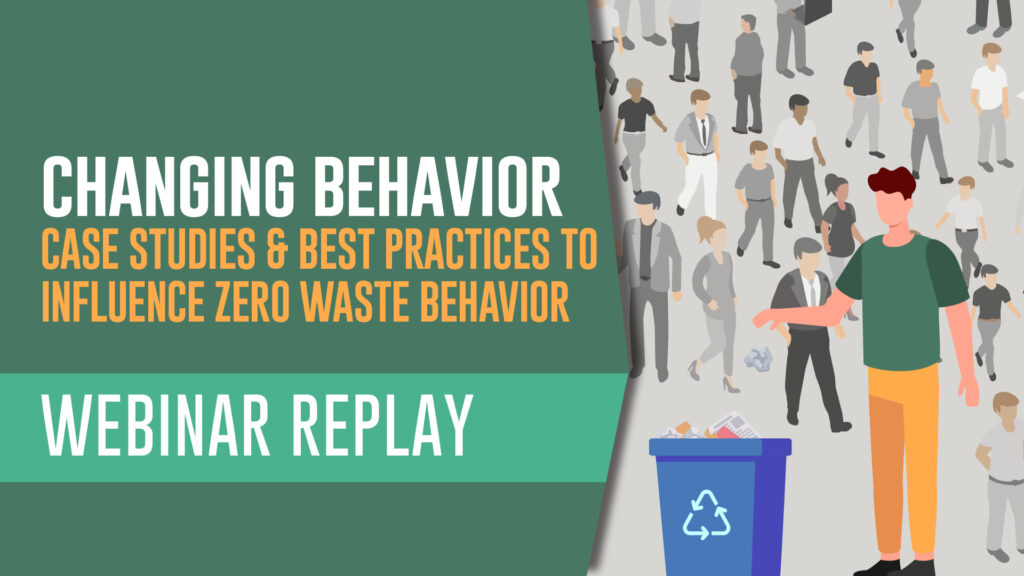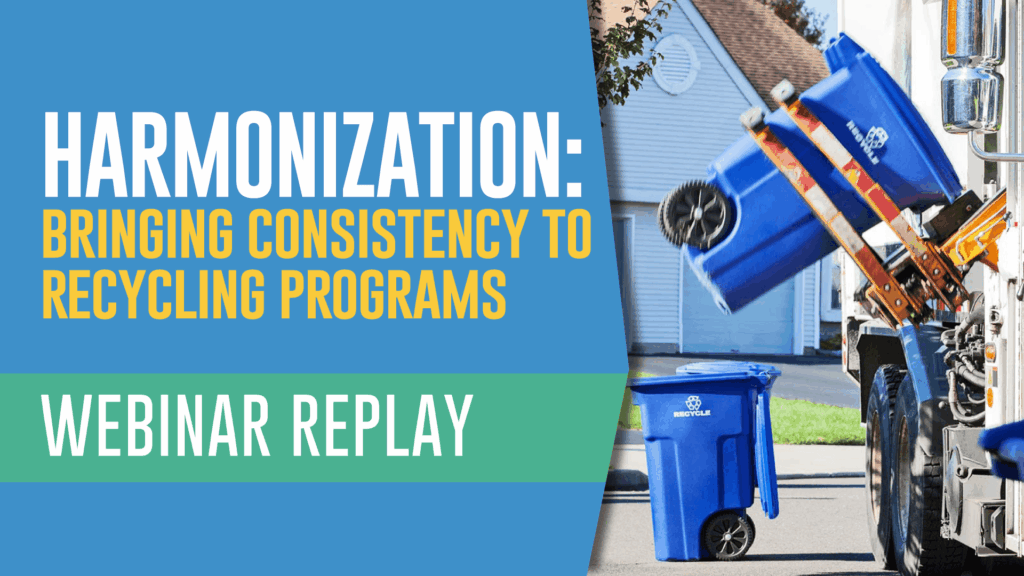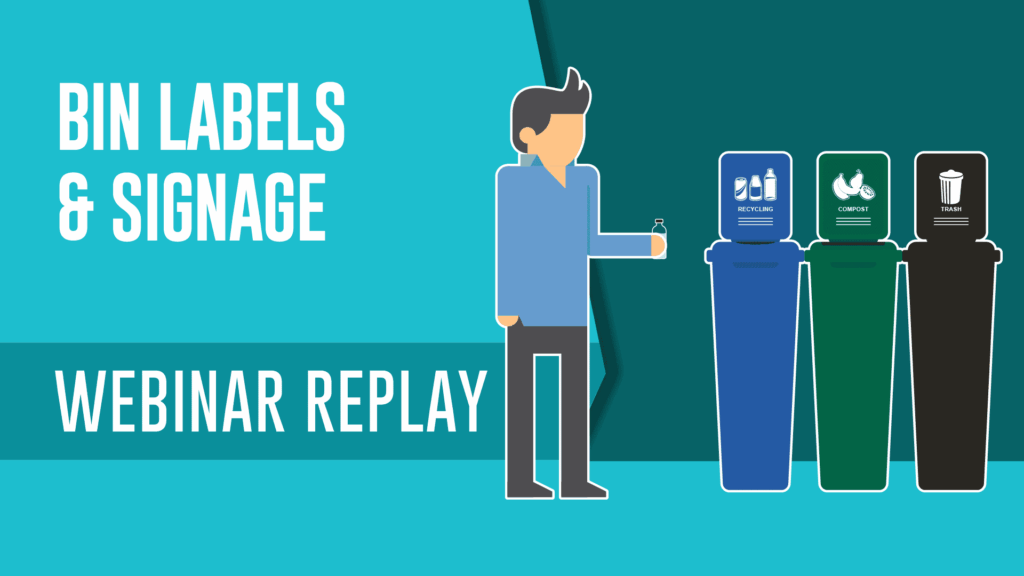Below are some of the questions that were answered live at the end of the webinar, and a few that were submitted and then answered by our panelists after the webinar ended.
Do compostable products perform up to the standards that you would expect for your facilities?
Lindsay – 10 years ago, 15 years ago, these products were really expensive and the quality was not as great. One thing I’m starting to see though is more fiber-based products (bamboo, etc). So there’s more variety and actually, from the Composter side, the compost facility has said they are more willing and interested in those products, and more and more are actually saying that they will not take those PLA products (the corn-based products that were not so great). So we’re really having to look more towards fiber-based products anyway, but in terms of quality and usability and price, I think the fiber-based compostable products have all seen major improvements.
Amy – Definitely doing that research and finding out where everything is going is really important. There’s so many different products on the line that are marked as compostable, that not all compostable products are created equal. So you need to do your research, and know for sure that what you’re buying can actually break down in the industrial composting facility that’s going to take it. Otherwise, it’s going to end up in a landfill, and you’re spending the extra money for nothing, and creating waste that actually takes longer to naturally break down than plastic. You need to be really careful when you are picking your products to make sure that it’s something that can be broken down correctly in the facility that it’s going to.
Did you look at the economics of reusables?
Amy – Yes, that’s actually one of the things we’ve looked at as well – is there a re-usable cup program that could work for us? Unfortunately, in venues our size (smaller), that’s really challenging, because the company that provides the cups wants to come and collect them, clean them, and then bring them back. And they don’t make enough if the venue is small, and there are not a lot of cups to provide us with, clean, and then return. So we’re not quite there yet, but hopefully it’s one of those things where if enough venues in the area adopt that sort of practice, then smaller venues our size would be able to come in and use a program like that too, all together, to make it worth the cup-company’s time and money. So that’s definitely something that we want to do in the future, we’re just not quite at that point yet.
Lindsay – Red Rock, I think this season, is switching to reusable aluminum cups. And I know there is a life-cycle analysis looking at the impact of single use cups versus plastic, aluminum, and compost versus re-usable – that is supposed to come out later this summer, and that is something I’ve been really interested in.
Did you consider going all-recyclable or all-compostable to address the fact that at a concert, people are not focused on trying to understand the straw can go here, but the fork needs to go here, etc? Is there a value in trying to come up with one, consistent “everything goes here”?
Amy – That’s something that was really important to us – making it so you’re kind of taking away their option of where they can throw it. And if everything is compostable, then it’s all going to go into one bin. We do sell some beer and wine that’s in aluminum cans, and are moving toward aluminum water bottles as well, so we did still want to have that option for recycling, for aluminum. But I think that if it’s very clear when you’re going to the bins – that will be next to each other – “OK, my can will go in this thing where it says ‘cans only’. OK, everything else goes in here.” I think that makes it really simple for that person when they’re making that split-second decision about where they’re going to throw their items.
Lindsay – We do: “if you drink out of it, recycle it, if you eat out of it, compost it.” So that’s an adage that we’ve kind of adopted, because if there’s food in something that’s recyclable, then it’s already contaminated. But then we have so many beverage containers that are aluminum or something like that that can be recycled, but not composted. So that’s the distinction.
Did you have specific contract language or terms that you put into your concession contract(s) to ensure that suppliers provide the right compatible packaging? (aluminum cups, etc)
Amy – We’re actually in the process of changing some concessionaires, and that’s something that I brought up in the process when we were talking to the different concessionaires. That this – [our waste diversion and recycling program] – is something that’s very important to us. And it’s something that I definitely would want to see explicitly in any contract, so they have to uphold it. I don’t have any terms or language to reference specifically, but having that conversation and writing it into the contract is something you definitely want to do. With our concessionaire, that’s one of the things that they require when they’re hiring food trucks – everything has to be in something that is compostable or recyclable. That’s a non-negotiable they require from everyone, and that’s something that they put in those agreements when they’re hiring those vendors.
How do you deal with “tailgate” at stadiums?
Jana – We actually partnered with GreenStreet Academy at one point. They would go through the parking lot, and get out the recycling bags and trash bags and clean up for us. I’m not sure how successful they were, but it’s always worth the extra effort, and much better than doing nothing.
Alec – From my experience, tailgating is a much harder stream to address than anything inside the stadium. Because, as we know, you don’t have that same control over what’s being generated. And folks are not necessarily in the mindset of recycling at all when they’re inside the venue, never mind after or before the event when they’ve had a few beers, and they’re outside. But, I know there are some good resources out there for college game-day tailgating. A number of case studies, including Penn State, Arizona State, others. I’m happy to point people to them, if anyone wants to contact me on the side.
When it comes to employee engagement in the waste programs, how do you best address staff turnover? Are there periodic trainings, or just initial ones upon hiring? How do you properly keep folks in the know about what the system is?
Amy – When we do our yearly training of staff, that’s one of the things that we’ll go over. And then when a new employee is hired, that’s just part of their training process. When they come in on their first day, we let them know right away; “this is very important to our venues, and you’re a part of that”. And we give them a tour of the appropriate receptacles where each thing goes, and that empowers them to help if a patron has a question about where something is supposed to go too. And that’s really important, because if our staff can’t even follow the directions, then how do we expect the rest of the people coming in our venues to do the same?
Lindsay – We also do an annual training, and we actually bring in our waste hauler. Then our staff is able to ask every single random question that they have. And sometimes, the process is changing, especially with the evolution of the recycling market. So sometimes they’re accepting something new, or not accepting something any more, and we get all that info at the same time. We also do a quarterly ‘Champion for the Environment Award’, where we recognize someone from any of the departments, and they get recognition at our All-Staff Meeting, a $100 gift card, and a certificate. We also, during Earth week, do a whole competition where they take a quiz, commit to actions, do those things, and then they get a gift card, or they can donate to an eco-organization.
I’m a student zero waste coordinator for my university trying to implement strategies for waste reduction in our stadium. Do you have any advice for getting my foot in the door and getting buy-in?
Jana – For me, it was about having a meeting with my boss to understand the goal, and then meeting with the recycling consultant or waste hauler to learn my boundaries. At that point, bring in the department managers for all entities involved in the mission to discuss what the process is, and how it will affect everyone’s operations.
One of my venues is hesitant to serve cans because they can be a projectile. How do your security teams view cans? Was that an easy conversation?
Jana – We remove bottles caps, as they were more of a projectile concern than cans are. I don’t even think we have any can issues here. I hope that helps!

















